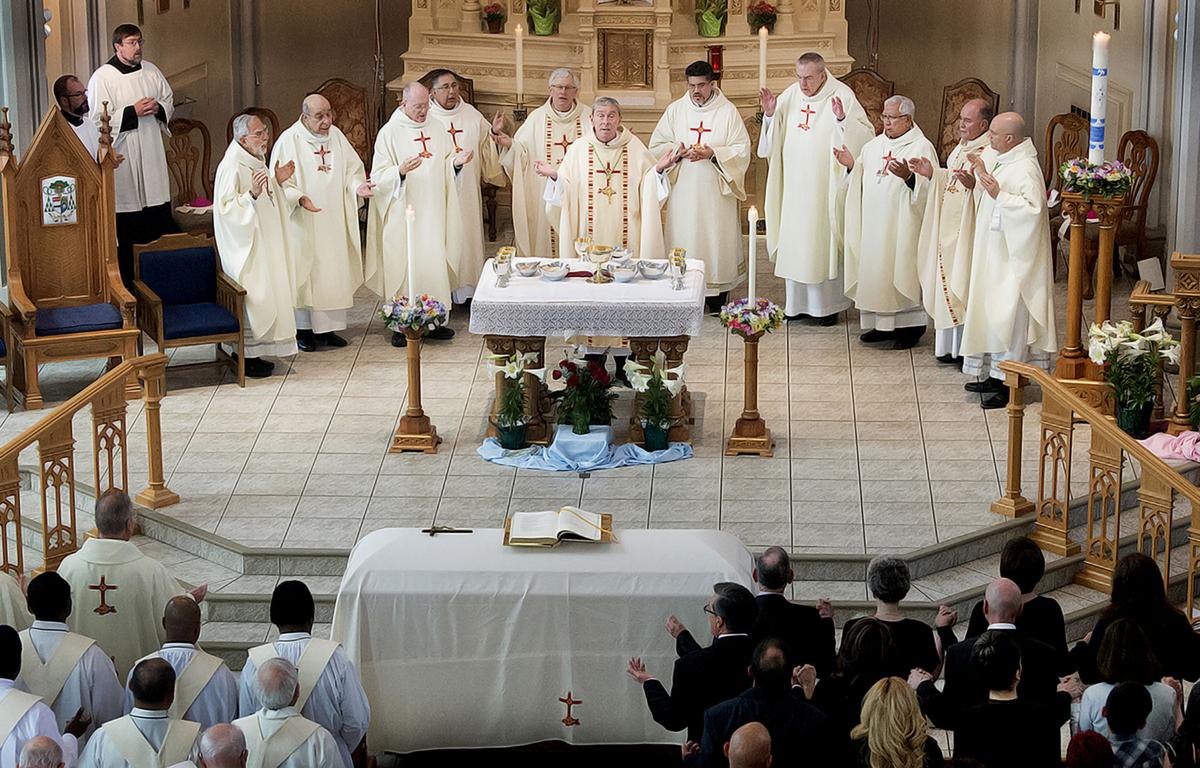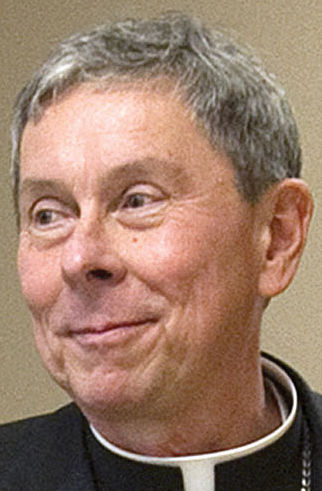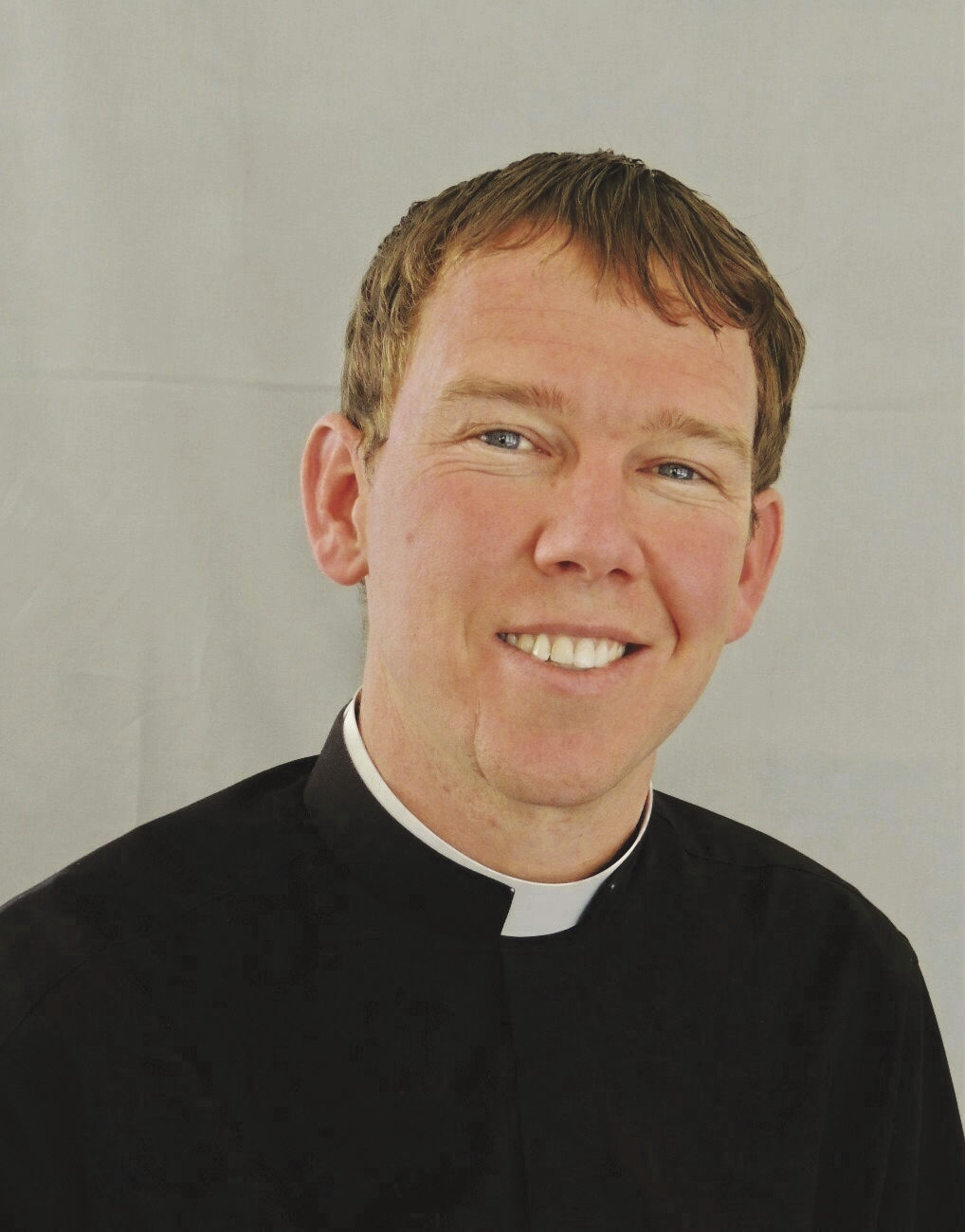Pueblo diocese looking for individuals willing to commit to priesthood, sisterhood
BY MIKE SPENCE |

The recent passing of the Rev. Ben Bacino hit hard the Catholic Diocese of Pueblo.
Bacino, a native Puebloan, had been a source of spiritual guidance, solace, kindness, faith and love at various churches in the diocese for more than 40 years.
Whomever replaces Bacino will have a significant void to fill. Bacino's legacy of caring is monumental.
Beyond that, Bacino's passing added to a pressing problem in the diocese: the shortage of priests.
In the past 14 months, six of the diocese's priests have died. Seven if you count former Bishop Arthur Tafoya. That's a significant loss just in terms of numbers. In terms of experience and the depth and breadth of collective knowledge they brought to the community, the loss of those seven men is almost inestimable.
Falling numbers
The number of priests working in the diocese has dropped consistently since 1991, when the diocese reported 83 priests.
Since then, the number fell to 71 in 1991 and to 50 in 2016, the latest year reported by the Center for Applied Research on the Apostolate.
The number has increased slightly since the last report. There now are 54 priests working in the diocese.
The number of Catholics in the Pueblo Diocese has fallen from just over 108,000 in 2001 to just under 60,000 in 2016, according to CARA.
Perhaps the starkest of the statistics about the Pueblo Diocese is this: In 1976, there were 57 parishes with a resident priest and just three without. In 2016, parishes with a resident priest barely outnumbered those without, 27-25.
Currently, the Pueblo diocese covers 30 Colorado counties and has about 38 administrations or parish clusters, comprising a total of 88 churches and missions. The 54 priests are tasked with serving all of the churches and missions.
The priest shortage isn't unique to Pueblo. In fact, it may be more acute nationwide, and even more dire worldwide.
The number of Catholic priests in the United States has declined from nearly 60,000 in 1965 to 37,500 in 2015. By comparison, over the same basic time frame, the number of people who identify themselves as Catholic has increased from 30 million in 1965 to more than 80 million today, according to CARA.
Despite those numbers, the United States has a better priest-to-parishioner ratio than most of the rest of the world, according to CARA.
Looking for a solution
 At just about every level of the church, solutions are being sought, from the parish priest to the pope.
At just about every level of the church, solutions are being sought, from the parish priest to the pope.
A vocations program was launched by The Most Rev. Stephen Berg, bishop of the Mission Diocese of Pueblo, when he took over the diocese four years ago.
"I ordained five priests in the four years since I got here," Berg said. "There was nobody left in the seminary."
Berg knew something had to change.
"Studies have shown if we can come to the level of 12 seminarians over a period of five years, we will begin to be self-sufficient in vocations to the priesthood," Berg said.
The efforts, so far, have produced two seminarians, and the diocese is taking applications for three more men for next year, Berg said.
It takes six to 10 years for someone entering the seminary to become an ordained priest. So, vocations are a long-term solution to the situation.
"In the meantime," Berg said, "we are very blessed to have the services of good international priests."
Places like Africa, India and South America are producing many of the world's priests, enough to send some of them to countries around the world.
Pueblo is benefitting from the energy and faithfulness of its international priests, Berg said.
Tough decision
Berg knows how difficult the decision is to commit to the priesthood.
He didn't enter the seminary until he was 42, and six years in, he said, he was still discerning what his life's vocation would be.
"You do know God is calling you," Berg said. "God calls everybody to a holy life. For me, it was God calling me to the priesthood. I realized I had to stop what I was doing and go to the seminary."
Berg said we all are called in some way.
"To be a committed man (or woman) of faith, to raise a family is a call. It's there. It's planted from the moment of conception," Berg said. "It's a natural thing God gives to everyone, a call to God.
"You just have to take time to listen to it. Develop it, until your prayers become a dialogue with God."
Stressing vocations
 One of the steps Berg took is already paying off -- naming a full-time director of vocations.
One of the steps Berg took is already paying off -- naming a full-time director of vocations.
Berg chose the Rev. Carl Wertin, who formerly served at Most Holy Family Catholic Church in Trinidad, as director of vocations. It was an inspired choice.
Wertin may be the diocese's best argument for becoming a priest. He is young, enthusiastic, energetic and certainly appears to love his job.
Wertin said he chose the priesthood because, "I wanted to do something bigger than myself with my own life."
Being a priest offers challenges and the satisfaction that comes from meeting them, Wertin said.
"The most satisfying thing about being a priest is leading a community in faith," Wertin said. "It sounds so simple: The natural desire to do good. This opportunity to be the leader of an organization whose whole purpose is to unite people in Christ and the good He desires for all.
"Not only am I responding to a call to do good myself and love in a powerful way, but I'm being called to lead that community in faith and lead that community in love."
Wertin said the job entails some joyful days and some difficult ones.
"Walking with a couple through marriage prep, being with them on their wedding day," Wertin said. "That's full of joy."
There also is a sense of accomplishment in helping people through difficult times.
"Being with a family who has lost a loved one and giving them spiritual support is a rewarding part of the job," Wertin said. "Just the acknowledgement of how appreciative that family is."
Tough job
Despite his enthusiasm for the priesthood, Wertin knows he is facing a difficult task as vocations director.
Taking lifelong vows of poverty, chastity and obedience to God -- and to the Catholic Church, which has at times been plagued by scandal -- often isn't the first option, or even the second, for young people.
Wertin does his best to present the positives of the job, while conceding the church has made mistakes in the past.
The sex-abuse scandal continues to haunt the church.
"We have to own up to it as a church," Wertin said. "Admit a mistake with the hopes of moving forward. We can't let people dwell in this culture of fear."
Wertin said the church has made "huge" strides in dealing with sex abuse.
"We are becoming one of the foremost organizations of child protections and being on the forefront of installing programs."
Wertin realizes he's bucking that change in the culture.
In years past, many young Catholic men committed to the seminary. Not all of them made it through, but there was enough interest that the seminary was considered a viable career choice for many.
The reason for the drop off in seminarians is partly because of the shrinking U.S. family, Wertin said. Families are smaller. A smaller pool of individuals produces fewer and fewer potential candidates. And only a small percentage of that shrinking pool is committing to Catholic vocations.
Wertin said the church is working to change this.
"We want to get to a place where vocations are encouraged in the parish and in the families," Wertin said. "We want priests to encourage the youth in their parishes to consider vocations."
He is slowly making progress in this game of numbers.
Hitting the road
Wertin travels to all the parishes in the diocese, bringing brochures to the families and students, meeting with Catholic schools and ministry programs.
"I just try to highlight the idea that everyone has a vocation, whether it is to married life or single life," he said.
A camp for young women who are discerning their vocation will be held in Woodland Park June 17-19. A retreat for young men will be held Aug. 7-10 in South Fork. The camps have been successful in the past.
"We had five young men commit two years ago and 10 last year," Wertin said. "Hopefully, we'll have 15 or so this summer."
Special family
Wertin said he grew up in a family that attended Mass every Sunday and was busy with church activities. He works with his brother, the Rev. Matthew Wertin, who is the chancellor of the diocese.
The Wertin brothers are part of a unique situation. Their father, the Rev. Henry Wertin, also is an ordained Catholic priest.
Henry Wertin was married for 31 years before losing his wife in a car accident. Already serving as a deacon at his church in Lamar, Henry Wertin decided to attend seminary and become a priest, a move that he said has strengthened his bond with God.
In generations past, families were bigger. Many Catholic families were very large, and often the children were encouraged to go into the priesthood or sisterhood.
That was the culture in which Henry Wertin was raised. He was one of 11 children in a family that regularly attended Mass. His own marriage produced 10 children, two of whom became Catholic priests.
Although both of the Wertin brothers are relatively young, they represent a different era for the Catholic church.
Berg, for one, believes Carl Wertin can reignite the enthusiasm for vocations from that time.
"I can see young people getting the call," Berg said. "There are priests and sisters out there. The encouragement is that God hasn't given up. We may have, but the call keeps coming."
